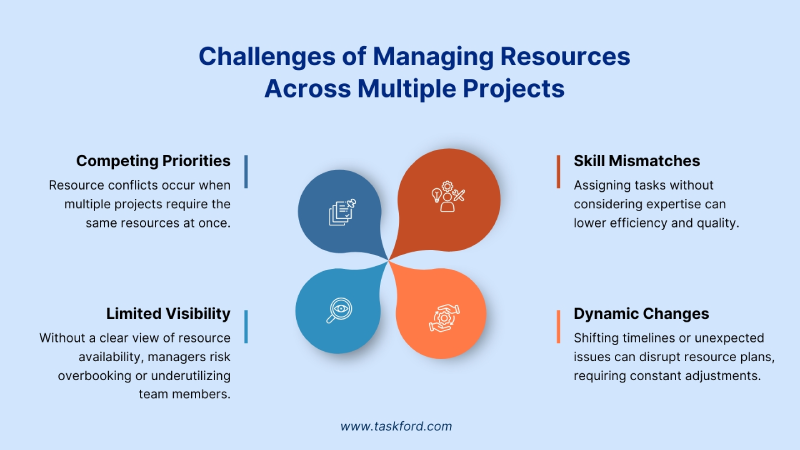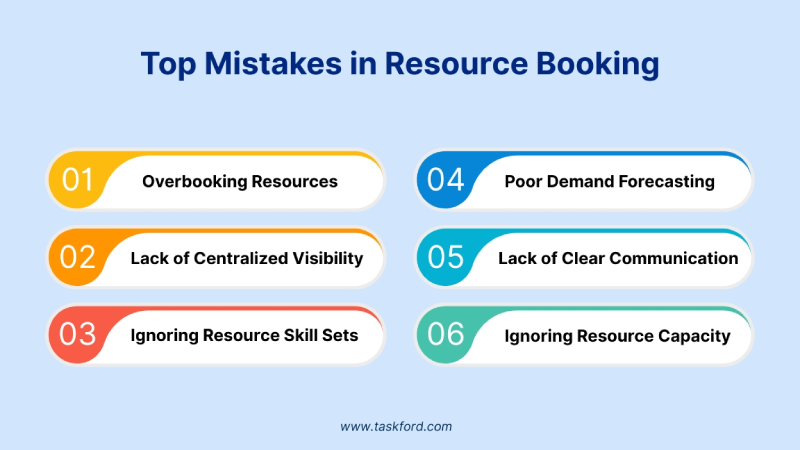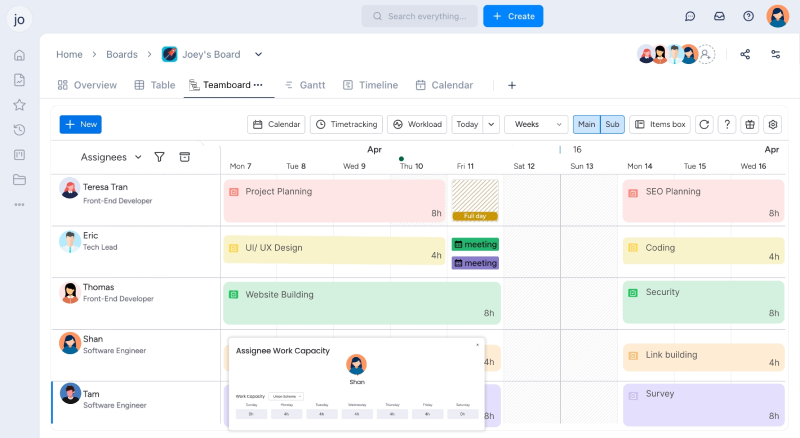Resource Booking in Multi-Project Environments: Top Mistakes and How to Solve Them
Learn the top resource booking mistakes in multi-project environments and discover practical solutions to avoid conflicts, improve efficiency, and keep your projects on track.
Managing resources across multiple projects is a balancing act that can make or break project success. Effective resource booking ensures that the right people, tools, and time are allocated efficiently, driving productivity and meeting deadlines. However, in multi-project environments, mistakes like overbooking or miscommunication can lead to costly delays and frustrated teams.
This blog explores the top mistakes in resource booking and offers practical solutions to streamline processes, optimize resources, and keep your projects on track.
Understanding Resource Booking in Multi-Project Environments
Resource booking is the process of assigning and scheduling people, equipment, and time to specific tasks across projects to ensure smooth execution. In project management, it acts as the backbone, aligning resources with project goals to meet deadlines and deliverables. Effective resource management ensures that the right resources are available at the right time, preventing bottlenecks and keeping projects on track.
Challenges of Managing Resources Across Multiple Projects
Managing resources in multi-project environments is no easy task. Key challenges include:

- Competing Priorities: Different projects often demand the same resources simultaneously, leading to conflicts.
- Limited Visibility: Without a clear overview of resource availability, managers risk overbooking or underutilizing team members.
- Skill Mismatches: Assigning tasks without considering expertise can reduce efficiency and quality.
- Dynamic Changes: Shifting project timelines or unexpected issues can disrupt resource plans, requiring constant adjustments.
Key Benefits of Optimized Resource Booking
When resource booking is done right, it brings significant advantages:
- Increased Efficiency: Proper allocation minimizes downtime and ensures resources are used effectively.
- Cost Savings: Avoiding overbooking and idle resources reduces unnecessary expenses.
- Timely Delivery: Streamlined scheduling keeps projects on schedule, meeting deadlines and client expectations.
- Improved Team Morale: Balanced workloads prevent burnout, fostering a productive and motivated workforce.
By understanding these core aspects of resource booking, organizations can better navigate the complexities of multi-project environments and set the stage for success.
Top Mistakes in Resource Booking
Resource booking in multi-project environments can go wrong in several ways, derailing even the best-planned projects. Below are the top mistakes that organizations often make, each with significant consequences that can disrupt efficiency and project success:

Mistake #1: Overbooking Resources
Assigning the same team member or equipment to multiple tasks at the same time stretches resources too thin. This leads to employee burnout, missed deadlines, and lower-quality work as individuals struggle to keep up with conflicting demands.
Mistake #2: Lack of Centralized Visibility
Without a single, clear view of resource availability across all projects, teams are prone to double bookings, underutilizing resources, or miscommunication. This lack of oversight causes inefficiencies and delays that could have been avoided with better tracking.
Mistake #3: Ignoring Resource Skill Sets
Assigning tasks without matching them to the specific skills or expertise required slows progress and increases the risk of errors. The result is often subpar outcomes that fail to meet project expectations and hinder overall success.
Mistake #4: Poor Demand Forecasting
Failing to accurately predict resource needs for current and future projects can lead to shortages during critical phases or wasted resources when demand is overestimated. This miscalculation disrupts project flow and inflates costs.
Mistake #5: Lack of Clear Communication
When project managers and teams don’t share clear, consistent updates about resource needs and availability, misaligned priorities and scheduling conflicts arise. This lack of coordination leads to missed deadlines and weakened team collaboration.
Mistake #6: Ignoring Resource Capacity
Failing to assess the true capacity of resources, whether in terms of time, skills, or energy, can lead to overburdening team members. This mistake often results in burnout, missed deadlines, and decreased quality of work. By accurately evaluating resource capacity, project managers can ensure tasks are assigned within realistic limits, preventing overload and maintaining productivity across multiple projects.
By understanding these common resource booking mistakes, organizations can take proactive steps to address them, paving the way for smoother and more effective project management.
Solutions to Common Resource Booking Mistakes
1. Solution for Overbooking Resources
- Use Resource Management Tools: Leverage resource planning software with real-time tracking to accurately monitor the availability of team members and equipment.
For example, with TaskFord, project managers can track individual workloads, resource utilization, and availability in real-time, preventing overbooking and resource conflicts. Through its advanced resource planning features, TaskFord allows for precise allocation, ensuring the right resources are assigned to the right tasks. With a user-friendly interface and dynamic scheduling tools, the app simplifies resource planning, enhances cross-project visibility, and ensures timely project completion by keeping teams aligned and tasks on track.

Set Realistic Limits: Be mindful of resource limits by setting realistic expectations about how much work each team member can handle. Regularly review and adjust allocations to prevent overburdening.
2. Solution for Lack of Centralized Visibility:
- Implement Centralized Resource Booking Software: Use a unified system to manage resource allocation across multiple projects. This ensures that all teams have access to the same information, helping to prevent double bookings and inefficiencies.
- Regularly Update Availability: Ensure that resource availability is continuously updated in the system to provide accurate, real-time data. This enhances visibility and coordination.
3. Solution for Ignoring Resource Skill Sets:
- Match Resources to Tasks Based on Skills: Use a system that tracks resource skills and certifications, and ensure tasks are aligned with team members’ expertise. This improves efficiency and the quality of the output.
- Conduct Regular Skill Assessments: Periodically review team skillsets and adjust resource assignments accordingly, ensuring the right resources are available for specialized tasks.
4. Solution for Poor Demand Forecasting:
- Utilize Historical Data and Analytics: Leverage data from previous projects to better predict future resource needs. Use forecasting tools to estimate resource demand more accurately, preventing both shortages and excess capacity.
- Create Flexible Plans: Build flexible project plans that can adapt to changing resource needs. Regularly update forecasts to stay aligned with shifting project requirements.
5. Solution for Lack of Clear Communication:
- Establish Clear Communication Channels: Use collaboration tools like Slack or Microsoft Teams to ensure consistent updates and clear communication regarding resource needs and availability.
- Regular Check-ins: Hold weekly or bi-weekly meetings to align team members on upcoming tasks, resource needs, and potential conflicts. This ensures everyone is on the same page
6. Solution for Ignoring Resource Capacity:
- Assess Resource Capacity Accurately: Evaluate not only the availability of resources but also their actual capacity, considering both time and effort required. Use software that helps track the overall capacity of each resource.
- Balance Workloads: Monitor workloads regularly to ensure team members aren’t overburdened. Distribute tasks evenly to keep resources operating within their capacity, preventing burnout and maintaining productivity.
By applying these solutions, organizations can address the most common resource booking mistakes, transforming potential pitfalls into opportunities for smoother, more effective project management.
Best Practices for Effective Resource Booking
To ensure resource booking in multi-project environments drives success, organizations should adopt proven best practices that enhance efficiency and collaboration. The following strategies provide a foundation for optimizing resource allocation and keeping projects on track:
- Prioritize Projects Based on Strategic Goals: Align resource allocation with organizational priorities by ranking projects according to their impact on business objectives. This ensures critical projects receive the necessary resources, maximizing overall value and success.
- Regularly Review and Adjust Resource Allocations: Continuously monitor resource usage and project progress to identify imbalances or emerging needs. Adjust allocations as needed to prevent bottlenecks, ensuring resources are deployed effectively across all projects.
- Train Teams on Resource Management Tools and Processes: Equip project managers and team members with training on resource booking tools and workflows. This builds confidence in using software and fosters consistent, efficient practices across the organization.
- Foster a Culture of Transparency and Collaboration: Encourage open communication about resource needs and availability among teams. Use shared platforms and regular updates to promote trust, reduce conflicts, and ensure everyone is aligned on project goals.
By embedding these best practices into resource booking processes, organizations can create a streamlined, proactive approach that minimizes mistakes, boosts productivity, and delivers projects on time and within budget.
Conclusion
Effective resource booking drives success in multi-project environments. Avoiding pitfalls like overbooking and poor communication, while using solutions like centralized platforms and skills-based assignments, optimizes resource use. Embrace best practices—prioritize projects, review allocations, train teams, and foster collaboration—to boost efficiency and meet deadlines. Evaluate your resource booking now, adopt the right tools, and ensure project success.
Related Resources:
- What is Resource Planing? Definition, Examples and How to Do it Right?
- Small Business Time Tracking Comparison 2025
- What is capacity planning? Actionable Tips and Strategies
Making work simpler,
smarter, and more connected
Join our waitlist and be notified first.

Related Blog
Subscribe for Expert Tips
Unlock expert insights and stay ahead with TaskFord. Sign up now to receive valuable tips, strategies, and updates directly in your inbox.






